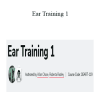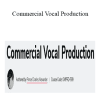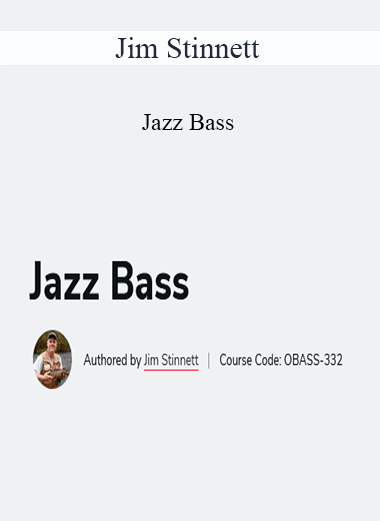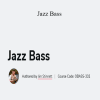Jim Stinnett – Jazz Bass
$1,250.00 Original price was: $1,250.00.$250.00Current price is: $250.00.
Digital Download: You will receive a download link via your order email after successful payment.
Jazz Bass explores the key ingredients necessary to play great jazz bass lines, including the sound, feel, foundation, and power.
Jazz Bass
Jazz Bass explores the key ingredients necessary to play great jazz bass lines, including the sound, feel, foundation, and power. Throughout the course, you will learn techniques for playing effective walking bass lines over jazz chord changes. The course begins by exploring “money notes”—the notes most valuable to a bass player to support and influence the band. You will play simple and functional walking bass lines over the blues and then progress to more sophisticated lines over jazz tunes, using chord tones in conjunction with half-step approach notes in multiple keys.
You will learn to recognize common chord progressions in jazz standards and play them effectively. The course highlights famous recordings from jazz greats—such as Paul Chambers, Ray Brown, Ron Carter, and Christian McBride—and teaches you strategies for modeling their performances. You will explore right- and left-hand techniques for both acoustic and electric bass, in addition to topics such as substitute chords, melodic development, and turnarounds. Each lesson will feature video demonstrations, listening examples, play-along exercises, and suggested practice routines, culminating with a walking bass line assignment that demonstrates the key concepts covered. The goal of the course is to give you the tools you need to improvise jazz bass lines like a seasoned professional.
“When a walking bass line is done right, everybody in the audience wishes they could play bass.” –Jim Stinnett, Jazz Bass course author.
Upon successful completion of this course, you will be able to:
- Play a walking bass line over jazz blues
- Transpose jazz blues to any key
- Hear and recognize the ii-v-i chord progression
- Transcribe walking bass lines
- Produce a jazz sound in your playing
- Develop a better physical technique
- Identify characteristics of the master jazz bassists
- Create a focused practice routine
Syllabus
Lesson 1 The Money Notes
Lesson 2 Build it Solid
Lesson 3 Developing a Harmonic Foundation
Lesson 4 Learn from the Masters
Lesson 5 The Rosetta Stone
Lesson 6 Melodic Development
Lesson 7 Modeling
Lesson 8 Hearing the Line
Lesson 9 Quarter-Note Melody
Lesson 10 How to Sound Like a Seasoned Pro
Lesson 11 Secrets of the Great Walking Bassists
Lesson 12 Cake Minus Eggs Ain’t Cake: The Importance of Balanced Learning
Requirements
Prerequisites and Course-Specific Requirements
Completion of Bass Performance 101 or equivalent knowledge and/or experience is required. Students should have knowledge of the bass guitar fretboard, an understanding of the modes of the major scale, and the ability to read music.
Required Textbook(s)
- Creating Jazz Bass Lines by Jim Stinnett, Stinnett Music
Software Requirements
- A basic audio recording tool that will allow you to record yourself and save the recording in MP3 format. You will have a tool to use for this purpose inside the learning environment. Alternatively, you can use software like Audacity (PC) or GarageBand (Mac)
- You must be able to submit notation—either hand-written and scanned or created using the notation software MuseScore, Finale Notepad, Finale, or Sibelius
Hardware Requirements
- For electric bass: a basic amp chord with a 1/4 to 1/8 adapter for recording directly into the computer
- For acoustic bass: a microphone with a 1/4 to 1/8 adapter for recording directly into the computer
- Audio interface such as the IK Multimedia Stealthplug, Focusrite Scarlett 2i2, Mbox, etc.
- A scanner is required for those creating scores by hand and is recommended for those using a notation program, so that you can handwrite portions of your scores, such as drum notation, if necessary
- A printer is recommended, so that you can print out music examples used in the course
- A built-in microphone or an external microphone plugged directly into your computer (via built in ports or an external audio interface)
Instructors
Author
Jim Stinnett is a professor at Berklee College of Music, where he teaches arranging and bass. He is a highly sought after producer, writer, and arranger, and is the founder of the Bass Workout and the musical director of the New Hampshire Bass Fest. A highly respected educator, Jim presents bass clinics and workshops all over the world. His extensive list of publications include The Music Of Paul Chambers, Arcology, Creating Jazz Bass Lines, All Cows Eat Grass, Reading in Bass Clef, Slap Bass Workout, and 12 Keys to Success.
Originally from the Northwest, Jim has enjoyed a rich performing career. As a first-call bassist in Seattle, Jim performed with nationally acclaimed artists, including Phineas Newborn, Jr., Jean-Pierre Rampal, Clark Terry, Ernestine Anderson, Kia Winding, and Sam Rivers. Jim’s credits also include performances and recordings with Joe Diorio, Lionel Loueke, Rufus Reid, Michael Manring, Ernie Watts, Phish, Kenwood Dennard, John LaPorta, Joe Hunt, Ernie Watts, Tal Farlow, the legendary NTSU 1:00 Lab Band, Red Garland, Buddy DeFranco, Anita O’Day, Roy Hanes, Boston Philharmonic Orchestra, Florida Gulf Coast Symphony, and Musicisti Americani Chamber Orchestra in Italy. Jim graduated from New England Conservatory of Music in 1986 as a student of Ed Barker.
Instructor
David Clark is bassist, multi-instrumentalist, composer, and producer. Before joining the faculty at Berklee, he was the resident jazz instructor at the International School for the Double Bass in Cincinnati during which time he was twice the recipient of the National Endowment for the Arts Jazz Study Grant. Dave currently teaches bass and jazz at Berklee, and is the musical director of the Berklee Faculty Inter-Galactic Sun Ra Astro-Infinity Myth Equation Commemorative Arkestra. As a performing bassist, David has appeared with Peter Frampton, the Drifters, Lesley Gore, and many others.
David is also a prolific jazz writer, and his compositions have been recorded by such artists as Gary Burton, Cercie Miller, and Tim Ray. He received the Massachusetts Council for the Arts Award for Jazz Composition. David holds bachelor’s and master’s degrees in composition from the New England Conservatory of Music.
What’s Next?
When taken for credit, Jazz Bass can be applied towards these associated programs:
Associated Certificate Programs
- General Music Studies Professional Certificate
- General Music Studies Advanced Professional Certificate
- Bass Professional Certificate
Get Download Jim Stinnett – Jazz Bass at IMC.sale today!
Delivery Method
– After your purchase, you’ll see a View your orders link which goes to the Downloads page. Here, you can download all the files associated with your order.
– Downloads are available once your payment is confirmed, we’ll also send you a download notification email separate from any transaction notification emails you receive from IMC.sale.
– Since it is a digital copy, our suggestion is to download and save it to your hard drive. In case the link is broken for any reason, please contact us and we will resend the new download link.
– If you cannot find the download link, please don’t worry about that. We will update and notify you as soon as possible at 8:00 AM – 8:00 PM (UTC+8).
Thank You For Shopping With Us!





10 reviews for Jim Stinnett – Jazz Bass
There are no reviews yet.